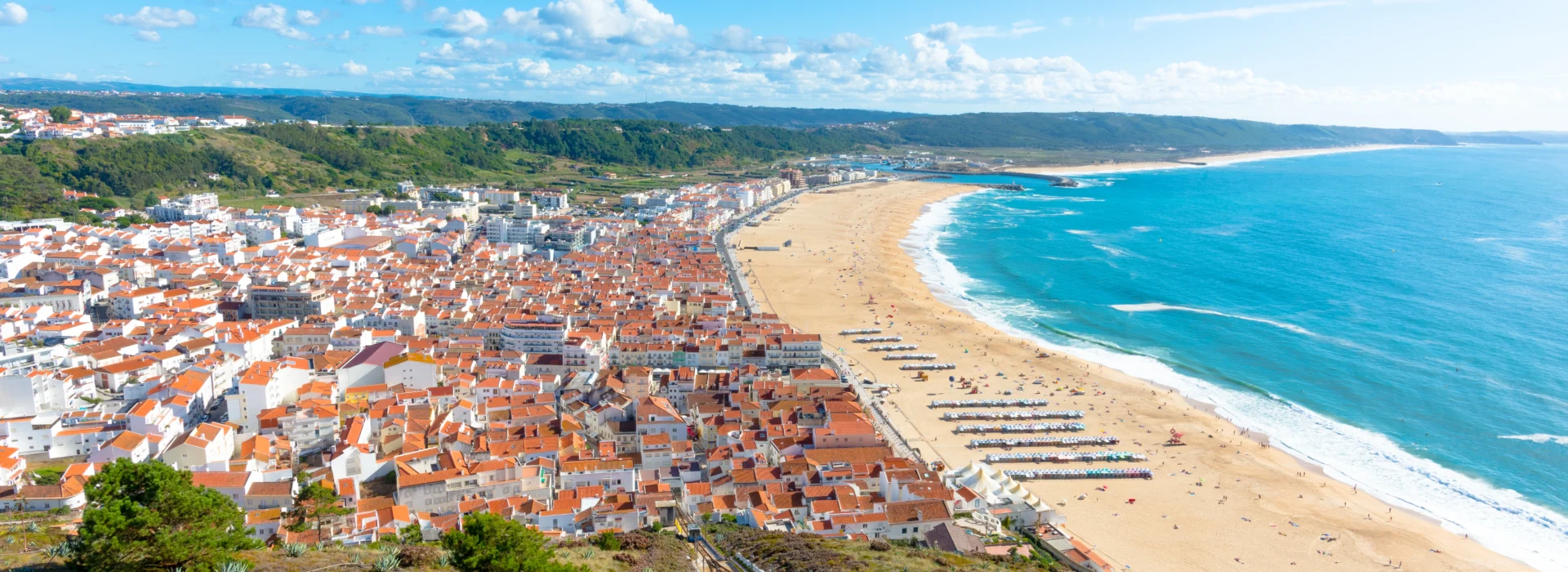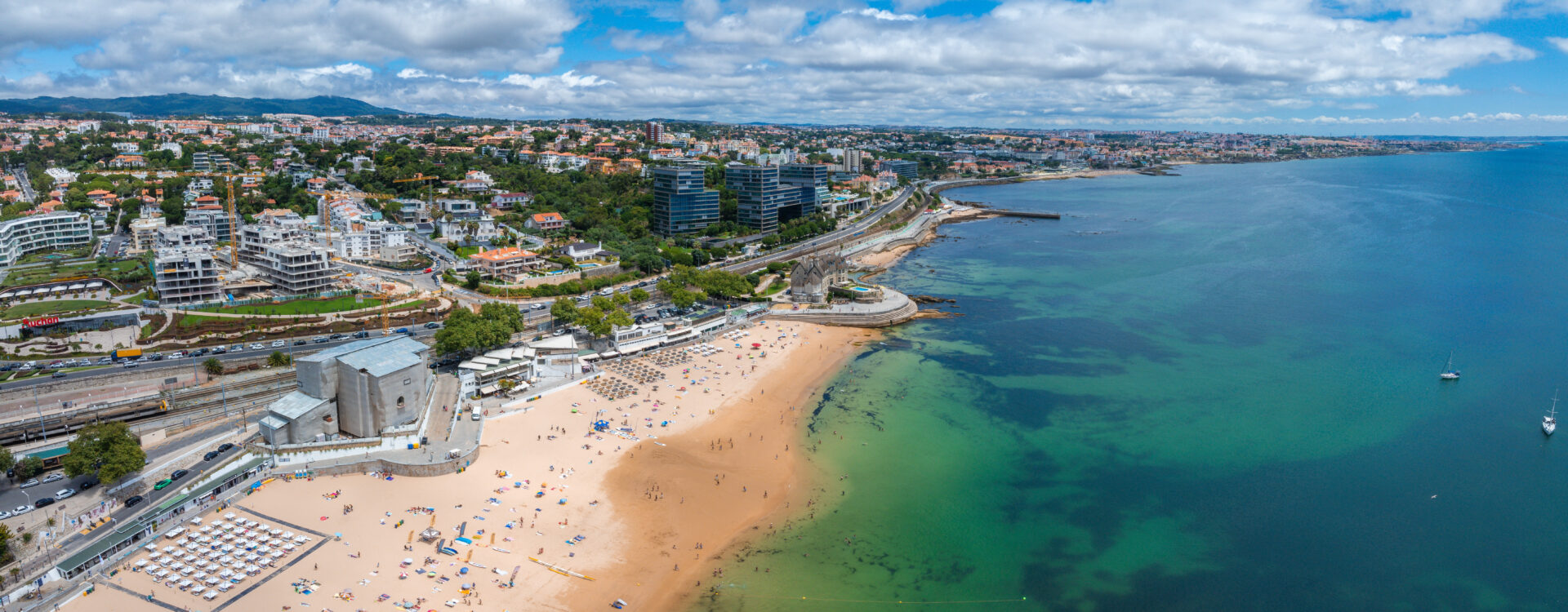Relocating from Germany to Portugal
More and more Germans are choosing Portugal as their next place to live. The country’s mild climate, safety, and approachable lifestyle appeal to those seeking balance without giving up stability and good public services. Within the EU framework, relocating is straightforward, allowing German citizens to settle, work, or retire in Portugal with minimal bureaucracy.
Among the newcomers are professionals working remotely, families looking for a slower pace and outdoor living, and retirees attracted by the climate and sense of community. What begins as a temporary stay often becomes a long-term move once people experience the rhythm of daily life — cafés, markets, and the sea within easy reach.
This guide explains what German citizens need to know when moving to Portugal: how to register residence, get a tax number, access healthcare, find housing, and understand taxes and costs of living. It also highlights cultural differences and practical details that make adaptation smoother.
For a broader overview of life in Portugal — including real estate, education, and the legal framework for new residents — explore our Complete Moving to Portugal Guide.

Talk to our Team
Table of Contents
Germany and Portugal: Context and Key Differences
Climate and geography
Portugal’s Atlantic–Mediterranean setting offers long, bright summers and mild winters, a marked contrast to Germany’s colder continental climate. Even in winter, southern regions such as the Algarve remain temperate, while the north and interior experience cooler, wetter months. The country’s smaller scale also means shorter distances between coast, countryside, and city life.
Pace of life and everyday rhythm
Daily life in Portugal tends to move at a slower, more personal rhythm. Shops may close for lunch, evenings stretch longer, and informal conversation plays a visible role in business and community life. Germans accustomed to strict punctuality and efficiency often find local flexibility both refreshing and occasionally challenging. Over time, most adapt by blending planning with a more relaxed social tempo.
Public services and language
Both countries maintain strong public systems, but their scale and accessibility differ. Administrative services are more centralized in Portugal, handled locally through municipal or regional offices. English is widely understood in Lisbon, Porto, and the Algarve, but long-term residents benefit greatly from learning European Portuguese, especially for healthcare, schools, or rural authorities.
Cost of living and value
Living costs in Portugal remain moderate compared with Germany, especially outside major hubs. Housing and fresh produce are often more affordable, while imported goods and electricity can be higher. Overall value depends on lifestyle and location — a household in coastal Lisbon may spend more than one in inland cities such as Coimbra or Évora.
Residency and Registration for EU Citizens
Entry and the 90-day rule
As EU citizens, Germans can enter Portugal freely with a valid passport or national ID card. No visa is required for up to 90 days. Those planning to stay longer — for work, study, or retirement — should register locally and obtain a residence certificate.
Registering residence (CRUE)
For stays exceeding 90 days, formalize residence at the Câmara Municipal (City Hall). The residence certificate, the CRUE (Certificado de Registo de Cidadão da União Europeia), confirms your legal right to live in Portugal. Typical documents: ID, proof of income or study, proof of address, and evidence of health coverage.
Family members and dependents
EU family members follow the same process. Non-EU relatives must apply for a residence card through AIMA after entry. German civil documents may require an apostille and translation into Portuguese by a certified translator.
Documents to prepare before leaving Germany
Bring your passport or ID, European Health Insurance Card, proof of financial means, civil status/family records (with apostilles if applicable), and academic or professional certificates. These make subsequent registrations faster.
Practical Setup After Arrival
Getting a NIF
The NIF (Número de Identificação Fiscal) is essential for rentals, banking, utilities, and mobile plans. Request it at a tax office (Serviço de Finanças) with ID and an address (temporary is acceptable). For EU citizens, it is usually issued the same day.
Bank account and utilities
With your NIF, opening a local bank account is straightforward. Most institutions request ID, proof of address, and proof of income. After that, set up electricity, water, internet, and mobile; direct debits simplify monthly management.
Healthcare (SNS) and social security (NISS)
After residence registration, sign up at your local health centre to obtain your SNS user number (Número de Utente). Employees are typically registered for social security by their employers; freelancers must apply for a NISS directly.
Local registrations and proof of address
A lease, utility bill, or landlord declaration generally works as proof of address. Once set, you can access municipal services, school enrolment, and transport passes.
Where to Live: Regions and Cities Popular with Germans
Greater Lisbon
Lisbon attracts professionals and digital workers who value air links, multilingual communities, and a growing startup scene. Central districts balance residential comfort with city access, while suburbs like Cascais and Oeiras offer more space, international schools, and a coastal lifestyle.
Northern Portugal and Porto
Porto blends strong local identity with international openness. Rents and property prices are below Lisbon on average, and nearby cities such as Braga, Guimarães, and Aveiro offer good value with solid transport links.
The Algarve
Southern Portugal remains a long-time favourite among German residents. English and German are widely understood, healthcare is accessible, and towns vary from lively coastal hubs to quieter inland villages.
Central Portugal and the Silver Coast
Nazaré, Caldas da Rainha, Coimbra, and inland towns offer affordability and a slower rhythm. Community ties are strong, and the cost of living is usually lower than in the main metropolitan areas.
Madeira and the Azores
Island life suits nature-minded residents and remote workers. Madeira offers mild weather year-round and frequent flights to the mainland; the Azores are greener and more remote, with a calm pace and tight-knit communities.
Housing: Renting or Buying in Portugal
Understanding the rental market
Renting is the usual first step. Expect one or two months’ deposit, proof of income, and a NIF. Always insist on a written, registered lease (contrato de arrendamento). Lisbon and Porto are competitive; outside these hubs, larger properties are easier to find at moderate prices.
Typical rent levels
Prices vary widely by region and neighbourhood. Central Lisbon and Cascais command the highest rents; Porto and Braga are lower on average; the Algarve fluctuates seasonally; smaller cities and interior towns are significantly more affordable. Check current data and local listings before signing.
Buying property
The standard path includes reservation, legal due diligence, a promissory contract (Contrato-Promessa de Compra e Venda), and the final deed (Escritura Pública). Budget for IMT (transfer tax), stamp duty, and notary/registry fees.
Mortgage options
EU citizens can access local mortgages subject to affordability checks. Typical financing covers a share of the purchase price, with fixed or variable rates. Expect to provide income proof and bank statements.
Tenant and owner rights
Portuguese law balances tenant and landlord rights. Rent increases are capped annually by government indexation, and disputes can be handled through the National Rental Mediation Office (Balcão Nacional do Arrendamento).
Cost of Living Compared with Germany
General overview
Portugal’s cost of living is generally lower than Germany’s, with marked regional variation. Lower housing costs, affordable public transport, and access to fresh produce often offset higher electricity and imported goods.
Housing and utilities
Rents are the main driver of savings outside prime Lisbon/Cascais. Utility bills can feel higher due to insulation differences and seasonal heating. Internet and mobile bundles are competitively priced.
Food and dining
Seasonal produce, fish, and bakery goods are good value. Imported brands, especially from northern Europe, tend to cost more. Lunch menus in cafés offer budget-friendly meals.
Transport
Integrated monthly passes in Lisbon and Porto are inexpensive. Running a car entails insurance, inspection, road tax, fuel, and tolls — many residents rely on public transport for daily commuting.
Typical monthly budgets
| Profile | Typical Monthly Budget (€) |
|---|---|
| Single professional in Lisbon | 1,600 – 2,200 |
| Couple in Porto | 2,000 – 2,800 |
| Retired couple in the Algarve (outside resort areas) | 1,700 – 2,300 |
| Family in a smaller city (Coimbra, Leiria, Braga) | 2,200 – 3,000 |
Actual costs vary by location, housing type, and lifestyle choices.
Banking and Money Matters
Opening a bank account
EU citizens can open accounts in person or online once they have a NIF. Typical requirements include ID, proof of address, and proof of income. Accounts are in euros and compatible with SEPA for cross-border payments.
IBAN, SEPA, and everyday banking
Portugal uses IBAN for all accounts. Within SEPA, euro transfers between Portugal and Germany are fast and usually low-cost. Online and mobile platforms make bill payment and direct debits simple.
Multibanco and MB Way
The Multibanco network enables ATM withdrawals, bill and tax payments, and top-ups for services. MB Way supports instant smartphone transfers and cashless payments, widely used for small purchases.
Managing money between Germany and Portugal
Sharing the euro simplifies finances across both countries. Many residents use digital banking alongside a local Portuguese account for rent, utilities, and taxes.
Tax representation
If you hold a NIF without a Portuguese address, you may need a tax representative (representante fiscal) to receive official correspondence. Once you register a local address, this requirement ends.
Taxes and Financial Planning
Tax residency
Tax residency depends on time spent and habitual home. Staying more than 183 days in a calendar year or maintaining a long-term home usually makes you tax resident in Portugal. Once resident, worldwide income is declared in Portugal, with treaty relief to avoid double taxation.
Income categories and filings
Portugal taxes employment, self-employment, investment, rental, and pension income. Rates are progressive. Annual returns (IRS) are typically filed in spring for the previous year.
Germany–Portugal double taxation treaty
The bilateral treaty allocates taxing rights and prevents the same income from being taxed twice. Keep records from both countries and align reporting for pensions, employment, and business income.
Successor to NHR and current incentives
The Non-Habitual Resident regime closed to new applicants in 2024. From 2025, IFICI targets innovation-related roles and specific profiles. Verify scope and eligibility with the tax authority before relying on any incentive.
Pensions and social contributions
EU coordination rules recognise contributions across member states. Taxation depends on residency status and pension type. Employees and self-employed residents contribute to Portuguese social security for access to benefits.

Talk to our Team
Working and Doing Business in Portugal
Employment opportunities
Opportunities span technology, renewable energy, tourism, education, healthcare, and shared services. English is common in international firms; Portuguese expands access to local roles. Lisbon and Porto concentrate most openings; the Algarve and central regions rely more on seasonal and service-sector jobs.
Contracts and labour rights
The Labour Code (Código do Trabalho) requires written contracts defining hours, pay, holidays, and termination terms. Standard workweek is 40 hours with at least 22 paid vacation days. Employees contribute to social security and access statutory benefits.
Freelancing and self-employment
Independent workers operate via the recibos verdes system. Opening activity requires a NIF and registration for tax and social security. E-invoicing is mandatory, and VAT may apply above thresholds. Keep accurate records and track deductible expenses.
Remote work and cross-border compliance
Long-term remote work can affect where taxes and social contributions are due. Under EU coordination, contributions are generally paid in one country. Maintain documentation and align with both tax administrations.
Starting a business
EU citizens can register as self-employed or incorporate without restrictions. The common company form is the Lda., similar to a German GmbH. Register for tax, social security, and VAT (if applicable) before trading.
Recognition of German qualifications
Many qualifications are recognised within the EU. Regulated professions may require formal recognition by Portuguese authorities. Academic equivalence is handled by the Direção-Geral do Ensino Superior (DGES).
Healthcare and Insurance
Access to public healthcare (SNS)
The Serviço Nacional de Saúde is open to legal residents, including EU citizens. After registering your address and residence, sign up at your local health centre to receive a user number, enabling access to GPs, hospitals, and prescriptions.
Using the European Health Insurance Card
On arrival, the German EHIC covers medically necessary care under the same conditions as residents. For stays beyond 90 days, SNS registration ensures ongoing coverage for treatment and prescriptions.
Private health insurance
Many residents combine public care with private insurance for faster appointments and wider specialist choice. Private hospitals and clinics are concentrated in Lisbon, Porto, and the Algarve; smaller towns have private doctors and diagnostics.
Pharmacies and emergency care
Pharmacies are widespread and marked by a green cross. The national emergency number is 112, and major hospitals operate 24-hour emergency departments.
Education and Family Life
Public schools and enrolment
Public education is free for resident children. Placement follows catchment areas based on address. Teaching is in Portuguese, with language support for foreign students. Education is compulsory from ages six to eighteen.
Private and international schools
International schools follow IB, British, or bilingual curricula. Families seeking a German-curriculum option will find long-established choices such as the German School of Lisbon (Deutsche Schule Lissabon). Apply early, particularly for mid-year relocations.
German-language and cultural options
German-speaking communities operate language programmes in Lisbon and the Algarve. For curriculum continuity and accreditation, contact schools directly to confirm recognition within the German framework.
Higher education and recognition of studies
Universities and polytechnics welcome EU students on national terms. The Abitur is recognised for admission. Academic recognition is handled by the Direção-Geral do Ensino Superior (DGES).
Family life and childcare
Kindergartens (jardins de infância) serve ages three to five; public and private crèches provide early childcare. Shorter commutes and outdoor routines support family time.
Transport and Driving
Using public transport
Lisbon and Porto combine metro, bus, tram, and suburban rail with integrated monthly passes. Medium-sized cities rely mainly on buses, and intercity trains efficiently link the coast and the north.
Exchanging an EU driving licence
EU citizens may drive with a German licence. After becoming resident, register your licence with the IMT. In some cases, a Portuguese licence may be issued, especially near expiry. Typical documents include ID, proof of residence, the original licence, and a medical certificate if required.
Buying or importing a car
Buying requires a NIF, proof of address, and vehicle registration at the Conservatória do Registo Automóvel. Importing a personal vehicle as part of a relocation may qualify for tax exemption; confirm eligibility and documentation with the Portuguese customs authority.
Costs and obligations
Car ownership involves mandatory insurance, inspections (Inspeção Periódica Obrigatória), and annual road tax (Imposto Único de Circulação). Fuel and tolls are relatively high, so many residents use public transport for daily commuting.
Cycling and sustainable mobility
Bike lanes are expanding in Lisbon, Porto, and coastal towns. E-scooters and bike-sharing are common. In small cities, walking often remains the most practical option.
Moving Belongings and Pets
Bringing household goods
Moves within the EU are straightforward. Keep an inventory and confirm insurance coverage with your mover. Delivery times typically range from one to three weeks depending on route and season.
Customs and tax relief
For goods coming from outside the EU or from storage abroad, customs declaration may be required. Personal items imported as part of a change of residence can be tax-exempt if owned and used for at least six months. Documentation includes proof of former residence, transport details, and an itemized list.
Bringing pets
Within the EU, pets require a microchip, valid rabies vaccination, and an EU pet passport. Airlines have specific cabin or cargo rules by size; book early. After arrival, register pets at the local Junta de Freguesia and keep vaccinations current.
What to bring vs. buy locally
Most residents bring personal items and leave furniture and appliances to source locally. Electronics use the same voltage and plug type (230V, Type F), so no adapters are needed.
Everyday Life and Integration
Learning Portuguese
English is common in cities and tourist areas, but learning Portuguese makes daily life easier and speeds up integration. Municipal courses and conversation groups are widely available.
Cultural norms and daily rhythm
Lunch breaks are longer, dinners start later, and communication is personable. Punctuality is valued but less rigid than in Germany. Adapting to this rhythm — planning ahead yet allowing for flexibility — makes life smoother.
Safety and healthcare access
Portugal is among Europe’s safest countries. The emergency number is 112. Once registered, access to SNS services and pharmacies is straightforward.
German communities and cultural connections
German residents are present across Portugal, notably in the Algarve, Lisbon, and Madeira. Community groups and cultural institutions — including the Goethe-Institut in Lisbon — host events, film screenings, and language courses.
Timeline and Relocation Checklist
Three to six months before moving
Choose your region and budget, research housing and schools, gather documents (ID, EHIC, proof of income, civil records), and start learning Portuguese. Check driving licence requirements with IMT if you plan to drive.
One to two months before departure
Secure housing and movers, notify German authorities and insurers, redirect mail, prepare copies of key documents, and book any residence or school appointments in Portugal. Confirm pet travel arrangements.
During the arrival week
Obtain your NIF, open a bank account, set up utilities, register residence (CRUE) at the Câmara Municipal, and register for healthcare at your local Centro de Saúde. Confirm social security registration if employed or self-employed.
First 90 days and settling in
Complete remaining registrations, update your address with authorities, get local transport passes, and join community activities. Review your budget and insurance once you have real cost data.
Common Pitfalls and How to Avoid Them
Missing administrative deadlines
Delays can affect healthcare access or proof of residence. Keep a checklist for NIF, CRUE, and SNS, and book appointments early where online scheduling is required.
Misunderstanding tax residency
Spending more than 183 days per year or keeping a habitual home usually makes you tax resident. Clarify your position early to avoid double filings or penalties.
Overpaying for rent or signing informal contracts
Always use a written, registered lease and verify that the property is legal for habitation. Compare listings to understand local price ranges.
Underestimating setup costs
Deposits, furniture, vehicle expenses, and professional fees add up. Keep a buffer of at least two to three months of extra savings for the transition period.
Cultural frustrations and adjustment
The slower pace and less rigid bureaucracy take getting used to. Patience and clear communication usually resolve issues faster than formal complaints.
Useful Contacts and Official Resources
Key Portuguese authorities
- AIMA — Agência para a Integração, Migrações e Asilo. Website: www.aima.gov.pt
- AT — Autoridade Tributária e Aduaneira. Website: www.portaldasfinancas.gov.pt
- SNS — Serviço Nacional de Saúde. Website: www.sns.gov.pt
- IMT — Instituto da Mobilidade e dos Transportes. Website: www.imt-ip.pt
German institutions in Portugal
- Embassy of Germany in Lisbon. Website: www.lissabon.diplo.de
- German Consulate in the Algarve (Portimão).
- German School of Lisbon (Deutsche Schule Lissabon). Website: www.dslissabon.com
- Goethe-Institut Lisbon. Website: www.goethe.de/lisboa
Other useful links
- Portal das Comunidades Portuguesas: portaldascomunidades.mne.gov.pt
- ePortugal (public services): www.eportugal.gov.pt
- EU Your Europe Portal: europa.eu/youreurope
Professional Assistance and Further Support
Relocating from Germany to Portugal is generally straightforward for EU citizens, yet managing paperwork, taxes, and housing can still require time and coordination. Access to local expertise helps new residents avoid delays and ensure compliance with legal and financial requirements.
Public institutions such as AIMA, AT, and municipal offices provide official guidance, though procedures may vary between regions. When questions arise about contracts, tax residency, or cross-border income, consulting a qualified accountant or legal advisor familiar with both systems can prevent costly mistakes.
This platform connects newcomers with reliable local partners who assist with relocation logistics, real estate searches, and administrative procedures. Whether moving temporarily or long-term, structured local guidance can make each step — from residence registration to choosing the right area and school — simpler and more predictable.

Talk to our Team
Frequently Asked Questions
Do German citizens need a visa to live in Portugal?
No. As EU citizens, Germans can live, work, and study in Portugal without a visa. Enter with your passport or national ID and stay up to 90 days freely. For longer stays, register as a resident at your local Câmara Municipal to obtain a CRUE certificate.
How long does it take to get a NIF and residence registration?
You can usually obtain a NIF on the same day at a tax office. The CRUE is issued immediately once you present ID, proof of address, and evidence of income or study.
Can I work remotely for a German employer while living in Portugal?
Yes. Remote work is permitted within the EU, but confirm how it affects tax and social security. Depending on duration and work pattern, you may need to register contributions or declare income in Portugal.
Are German pensions taxed in Portugal?
Taxation depends on residency status and the pension type. Under the Germany–Portugal double taxation treaty, income is taxed only once, typically where it originates, but it must still be declared in Portugal for transparency.
Is healthcare free for EU residents?
Public healthcare is subsidised. Residents pay small co-payments for consultations and prescriptions. Private insurance can complement public coverage for faster access to specialists.
Are German driving licences valid in Portugal?
Yes. You can drive using your German licence. After becoming a resident, register your licence with IMT, especially if it is close to expiry.
Can my family join and study in Portugal?
Yes. EU family members have the same residence rights. Children can enrol in public or private schools, and language support is commonly provided.
How expensive is everyday life compared with Germany?
Overall living costs are often 25–35% lower, particularly outside Lisbon and the Algarve. Housing and food are usually cheaper; electricity and imported products can be higher.
This guide was prepared with care to provide clear, factual information based on official Portuguese sources such as AIMA (Agência para a Integração, Migrações e Asilo), AT (Autoridade Tributária e Aduaneira), SNS (Serviço Nacional de Saúde), IMT (Instituto da Mobilidade e dos Transportes), and INE (Instituto Nacional de Estatística). While we aim to keep content current, readers should always confirm details with official institutions or qualified professionals when planning their move.














